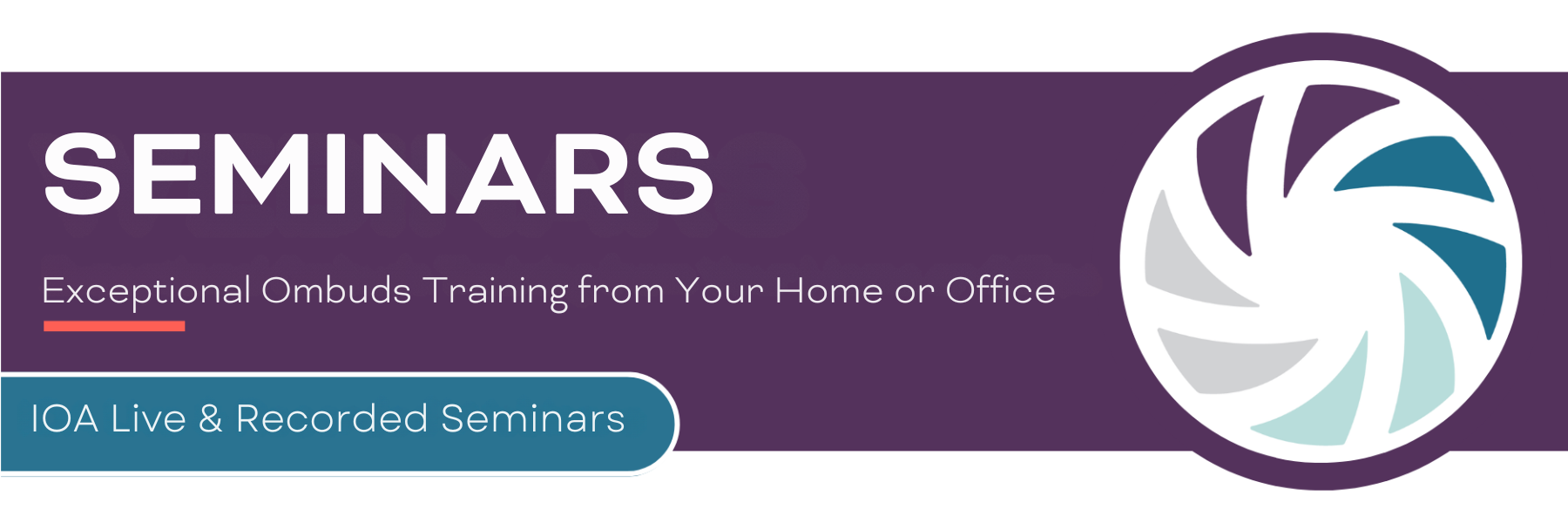- About IOA
- About IOA
- Board of Directors
- Committees & Task Forces
- Regional Advancement Communities
- Strategic Plan
- Standards of Practice & Code of Ethics
- Frequently Asked Questions
- IOA's Ombuds for Members
- Inclusion and Belonging
- IOA Values and Norms
- IOA Concern and Complaint Policy
- Contact Us
- Sponsorship Opportunities
- IOA Sponsors
- About Ombuds
- Membership
- Events & Training
- Certification
- Resources
- Publications
|
|
| Member/Group Member | $50 |
| Student Member | $50 |
| Retired Member | $50 |
| Non-Member | $250 |
About the Course
In workplaces where unions are present, ombuds professionals face unique challenges and opportunities. Federal agencies, universities, and healthcare organizations each contend with various collective bargaining agreements (CBAs), while some are actively working to establish one. The question arises: does collaborating with unions compromise ombuds independence, or is it a necessary channel to better serve employees?
Join a diverse panel of experts—a Higher Ed Ombuds, a Healthcare Ombuds and Canadian Federal Public Sector Ombuds—as they share insights and lessons learned from working in unionized environments. This interactive session will feature a blend of lecture-style learning, panel Q&A, and open dialogue, inviting attendees to contribute experiences and pose questions.
The discussion will begin with an overview of the current landscape, highlighting the increasing prevalence of unions in federal settings and the common features of CBAs. Panelists and attendees will then delve into real-world scenarios where ombuds have navigated union involvement to support their clients. The session will close with a conversation about the ethical considerations and independence challenges faced by ombuds in unionized environments.
This hybrid panel will feature both in-person and online participation, utilizing digital tools for dynamic presentation and audience interaction.
Learning Objectives
After engaging in this session, participants will be better able to:
- Understand the Impact of Unions on Ombuds Work: Participants will be able to identify and explain how the presence of unions and collective bargaining agreements can influence the role and functions of an ombuds in various organizational contexts.
- Assess the Implications for Ombuds Independence: Participants will critically evaluate whether engaging with unions affects the independence of the ombuds or if it represents a necessary formal channel for addressing workplace issues.
- Identify Opportunities for Collaboration: Participants will recognize and explore potential opportunities for collaboration between ombuds and unions to enhance conflict resolution and organizational effectiveness.
Instructor
Moderator: Ellen Miller
Panelists: Sarah Klaper, Sylvie Richard, and Elianne Hall
Additional Details and Event Policies
Ombuds Online Seminars focus on emerging topics of interest to ombuds, while others teach diverse skillsets that can enhance an ombuds’ practice. Seminars allow for a deeper dive and more interactive experiential learning formats than a webinar. You can register for a live seminar, or you can purchase that seminar on-demand.
Professional Development Hours (PDH)
This course has been approved for 2.5 PDH.
Cancellation Policy
All cancellation requests received on or before Thursday, 29 May 2025 will be issued a refund less a $25 processing fee. No refunds will be given thereafter except in the event of extenuating circumstances. Requests for registration cancellation must be submitted in writing via email to [email protected]. Substitute attendees will be permitted. Substitution requests must be in writing via email to [email protected] no later than two days before the event's start date of 12 June 2025.
Nonpayment Policy
Full payment of course registration fees is required before the start of the course. If full payment has not been remitted on or before 29 May 2025, event details will not be released to your registration. If you have any questions, please contact the office at [email protected] or by phone at +1-206-209-5275.
Technical Failure Policy for Virtual Courses
It is the responsibility of the registrant to confirm system requirements and test their computers prior to the start of each virtual session. If a technical failure is the fault of the service provider and the session is not able to be broadcast as planned, IOA reserves the right to reschedule the session. If an attendee experiences a technical failure on their end, IOA is not responsible for refunding the participant or providing applicable PDH hours.
Virtual Session Recording Release
Each virtual session may be recorded, including chat transcripts. These recordings may be provided for later viewing and may be used for promotional purposes, advertising, and other print and online materials at the sole discretion of IOA. By registering for a virtual session you consent to be recorded by IOA when attending live sessions.
Language and Captions
This course is presented in English. Captions are available in English by default. Individual participants may choose to see their captions translated into one of the following languages: Arabic, Bangla (beta), Chinese Simplified, Chinese Traditional, Czech, Danish (beta), Dutch, Estonian, Finnish, French (France), German, Hebrew (beta), Hindi (beta), Hungarian, Italian, Japanese, Korean, Malay, Norwegian (beta), Polish, Portuguese, Romanian (beta), Russian, Spanish, Swedish, Tamil (beta), Turkish, Ukrainian, or Vietnamese.

